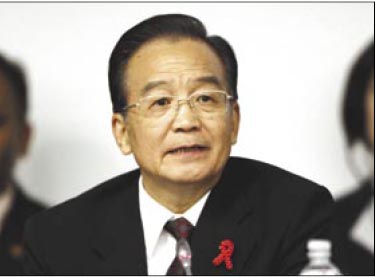China
China charts development goals
By Wu Jiao and Zhang Yuwei China Daily (China Daily)
Updated: 2010-09-23 17:11
 |
Large Medium Small |
|
 Premier Wen Jiabao on Wednesday addresses a high-level discussion panel on AIDS and the MDGs in New York. Yao Dawei / Xinhua |
NEW YORK - Aiming to bolster the global fight against poverty, China on Wednesday announced new measures to fulfill its own development goals as well as help those in developing countries.
Despite notable efforts made by China in meeting the Millennium Development Goals (MDGs), the nation will continue to strengthen efforts to ensure that it achieves the MDGs by 2015, said Premier Wen Jiabao during the high-level plenary meeting of the UN General Assembly on MDGs.
Yet, he noted that there were challenges in meeting the goals due to regional imbalances.
The next five years will be critical in fulfilling the MDGs, and the global community should stand firmly behind Africa in its efforts to reduce poverty and bolster development, Wen said.
He also urged developed nations to honor their promises to help developing countries.
Wen also announced new measures that China will take to honor its promise of helping other developing countries.
According to Wen, China would build 200 schools for developing countries, dispatch 3,000 medical experts, and train 5,000 medical personnel to assist these nations.
China will provide medical equipment and medicines to 100 hospitals, and help build 200 clean energy and environment protection programs. It will also donate $14 million to combat HIV/AIDS, tuberculosis and malaria, he said.
The nation will reduce or cancel the debt of poor countries, and continue to provide preferential loans and credit support for developing countries, Wen said.
China will expand the scope of products and countries that enjoy zero-tariffs in trade with the nation, and encourage domestic firms to invest in developing countries, he emphasized.
The nation will strengthen agricultural cooperation with developing countries in the next five years, dispatching 3,000 experts and technicians to those countries, and invite 5,000 agricultural personnel to China for further training, Wen said.
China will train 80,000 personnel for the developing nations in the next five years, increase the number of scholarships for students wishing to pursue their studies in China, and provide training for 3,000 headmasters and teachers, he said.
According to data put out by the UN Department of Economic and Social Affairs, China accomplished the objectives of halving the number of poor and hungry people, popularizing elementary education, and reducing child mortality, earlier than scheduled.
In particular, China has contributed to 70 percent of the world population that have risen from poverty over the past two decades.
Earlier, during a meeting with the premier on Wednesday, UN Secretary-General Ban Ki-moon praised China's success in reducing poverty, saying it could serve as an example for many other countries.
The Secretary-General also expressed his appreciation for China's contributions to various UN peacekeeping operations, and sought China's continued support in Sudan, Liberia and the Democratic Republic of Congo (DRC).
They also exchanged views on climate change and the upcoming UN Climate Change Conference in Cancun, Mexico, from Nov 29 to Dec 10.
Wen also attended a UN panel on Wednesday that discussed ways to facilitate anti-AIDS efforts as part of the global drive to meet the MDGs.
On the sidelines of the Summit, Wen attended a ceremony together with the United Nations Development Programme (UNDP) Administrator Helen Clark for the signing of a MOU on strengthening cooperation between China and UNDP.
The MOU charts good partnership between China and UNDP, and reaffirms the commitments made by UNDP in the China/UNDP Country Program (2011-15) to further providing development assistance to China and continuing its cooperation with the nation in the areas of poverty eradication, environment and sustainable development, gender equality and other areas.
Zhou Yiping, director of the special unit for South-South Cooperation at the UN told China Daily: "Many developing countries have collected successful lessons from achieving the MDGs in the past years, and they developed innovations which their peers can borrow and adopt from in their MDG implementation programs. And these innovations are exactly what least developed countries need."
South-South Cooperation is trying to establish a bridge for countries of the global South to exchange resources, technology, and knowledge between developing countries to achieve development goals together, he said.
Wen's visit is an indication of China's commitment to the work of the UN. This is the third consecutive year that top Chinese officials have made headline appearances at major UN conferences.
This is the second time that Wen has participated in meetings at the UN headquarters. Chinese President Hu Jintao also attended the UN conferences last year.
Wen will address the general debate of the 65th session of the UN General Assembly on Thursday.